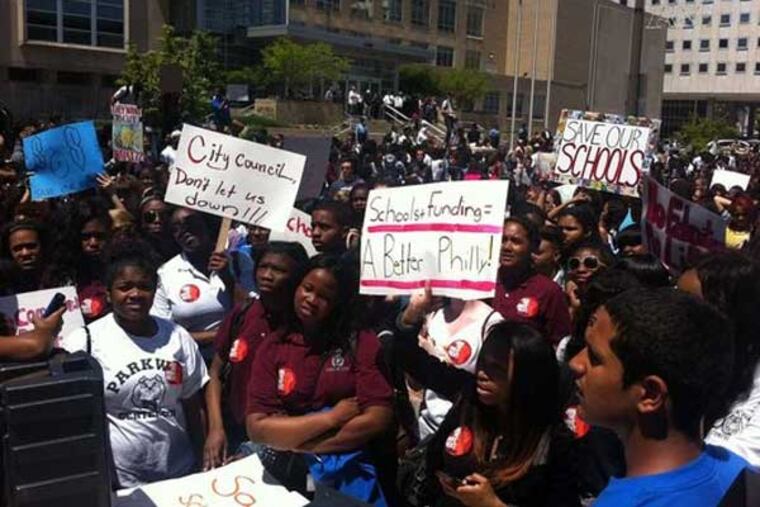Phila. Council panel advances school bailout bill
With cries of protest coming from all directions - from dozens of business owners in Council chambers to thousands of public school students marching down Broad Street - a Philadelphia City Council committee advanced a bailout measure Friday for raising $30 million for the School District through a higher Use and Occupancy tax.

With cries of protest coming from all directions - from dozens of business owners in Council chambers to thousands of public school students marching down Broad Street - a Philadelphia City Council committee advanced a bailout measure Friday for raising $30 million for the School District through a higher Use and Occupancy tax.
The finance committee voted, 5-1, to move a bill to the full Council that would set the tax for businesses at 1.4 percent.
Mayor Nutter opposes the measure, preferring his own plan for raising $95 million for the School District. That plan calls for new taxes on cigarettes and liquor by the glass, stepped-up efforts to collect taxes, and a Use and Occupancy tax of 0.92 percent.
The committee heard four hours of testimony from critics and supporters, who agreed that time was running out on the School District.
Rob Dubow, the city's finance director, warned that raising the Use and Occupancy tax would "send a bad message to businesses." But he said the administration did support one measure in the bill: waiving the first $2,000 in taxes.
Councilwoman Maria Quiñones Sánchez said that would help small-business owners in particular. She said the mayor's recent citywide effort to assess properties at fair market value for - the so-called Actual Value Initiative - would result in lower taxes for the biggest commercial and industrial property owners.
Raising the Use and Occupancy tax would "leave some of that on the table for our children," she said.
Dubow said the mayor would rather try to push through a $2-a-pack cigarette tax and raise the tax on liquor by the glass from 10 percent to 15 percent. He said the administration had enlisted Philadelphia lawmakers in Harrisburg and received their support for the plan.
But Councilwoman Blondell Reynolds Brown said persuading other state lawmakers to endorse the ideas would be "a heavy lift" for Nutter.
Several who voted for the bill thought it would be too risky to have to wait for action from Harrisburg. Council must pass a new budget by the end of June.
The only dissenter was Bill Green. "We keep applying Band-Aids to a patient who is bleeding out," Green said.
The School District needs $300 million to fill a budget gap for next year. Superintendent William R. Hite Jr. hopes to get $60 million more from the city, $120 million from the state, and the rest from concessions from the teachers' union.
As the committee sat through testimony, thousands of students marched from School District headquarters at 440 N. Broad St. to City Hall to remind them of the dire state of their schools.
Chanting "Save our schools" and "No education, no life," they assembled in the City Hall courtyard. Teacher support specialist Emily Taylor said the students' voice was important for officials to hear. "I am very proud of them," she said. "I think they realize now that their education is in jeopardy. If [Council members] don't listen to them, then who are they going to listen to?"
John Carlos, a student at Conwell Middle School, said, "We don't get art, we don't get music and things like that. That's why we are out here."
Phil Goldsmith, a director of Public Citizens for Children and Youth, a child advocacy nonprofit, said there was no easy fix to the school problem. But he said the city was going down the "wrong path."
The city, he said, should look for revenue in other places. He suggested modifying its 10-year real estate tax abatement program or appealing to tax-exempt institutions such as universities to pony up money for schools.
Robert Zuritsky, president of Parkway Corp., which has parking garages throughout Center City, said that instead of raising taxes, the city should do a better job of collecting ones already on the books. Philadelphia's tax-collection rate falls behind those in other big cities.
"There is nothing more offensive than asking good and honest people to pay more when the city is not doing more to collect taxes," he testified.
Dubow said the city hoped to increase its collections this year by $28 million.
Robert Wunderling, head of the Greater Philadelphia Chamber of Commerce, said another tax increase would have "a chilling effect" on the business environment.
"It once again puts on the business community the sole burden" of helping the public schools, he said.